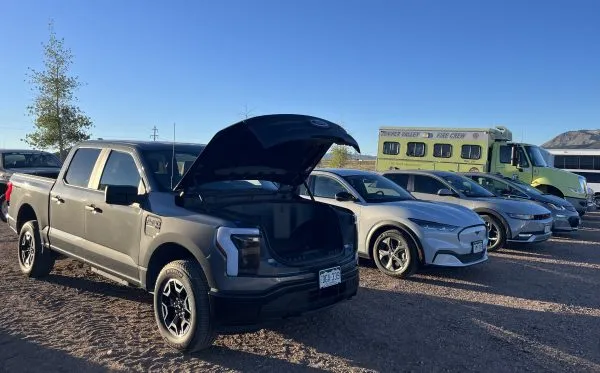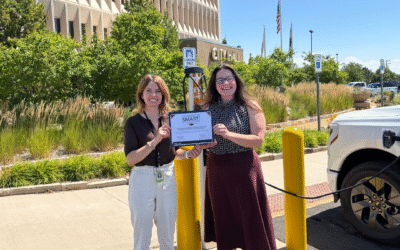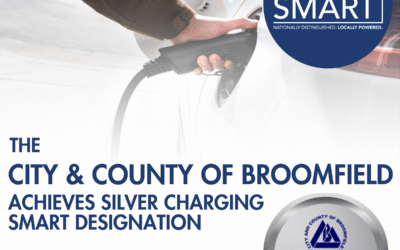Location: Colorado Springs, CO
Fleet Type: State Agency
Narrative
The Colorado Department of Corrections (CDOC) serves as the state agency responsible for the management of Colorado’s prison system. The agency operates 38 facilities statewide, including high-security prisons, medium-security facilities, minimum centers, and Parole Offices. CDOC’s fleet is made up of over 1,100 vehicles, ranging from light-duty sedans and trucks to snowplows, cranes, and high-risk buses and vans. Among all Colorado state agencies, CDOC boasts the largest fleet of electric vehicles (EVs), encompassing both battery-electric vehicles (BEVs) and plug-in hybrid electric vehicles (PHEVs).
In 2017, CDOC introduced its first EVs, starting with two Chevy Bolts, at its Denver complex and installed six charging ports. Since then, CDOC has significantly expanded its electric fleet, now with an impressive 169 EVs (and growing). This includes 16 BEVs, which consist of Hyundai Ioniq 5s, Ford F-150 Lightnings, Ford Mach-Es, and Chevy Bolts, as well as 153 PHEVs, comprised of Ford Escapes, Mitsubishi Outlanders, Kia Niros, Toyota Prius Primes, and Chrysler Pacificas. The agency’s light-duty vehicles serve as prime candidates for electrification due to their shorter routes, often used for motor pool services or localized transportation.
CDOC’s fleet of EVs is accompanied by 22 charging ports across its facilities. The agency has grant funding in place from the Colorado Energy Office utilizing SB21-230 funds. Through this funding, CDOC has plans to install 52 level-2 ports and 6 level-3 ports. CDOC is also actively pursuing other grants such as the Colorado Energy Office’s Fleet-ZERO Program. Recently, on March 20, 2024, CDOC broke ground on its Headquarters EV Charger Project which when complete will boast 2 level 3 charging ports and 12 level 2 charging ports.
Outputs and Outcomes
In 2019, Colorado established statewide targets for reducing greenhouse gas (GHG) emissions: 26% by 2025, 50% by 2030, and 90% by 2050, compared to a 2005 baseline. Furthermore, the 2022 Greening of State Government Executive Order D 2022 016 mandated that state agencies reduce GHG emissions from fleet vehicles by 15% by the end of Fiscal Year (FY) 2024-25, using a FY 2014-15 baseline. This executive order also directed state agencies to procure EVs when possible and designated EVs as the default vehicle type for future light-duty vehicle purchases. CDOC’s efforts not only comply with state goals but also position them as a valuable resource for other state agencies looking to electrify their fleets.
In addition to overseeing the state’s prison system, CDOC provides rehabilitative and educational programs for inmates. These programs are aimed at advancing inmates’ skills and knowledge, which can enhance their prospects for employment and successful reintegration into society upon release. The programs encompass a range of offerings, including Career and Technical Education programs like automotive pathways. CDOC recognizes EVs as a unique opportunity. The agency is looking into ways to incorporate EV and charger training into future programming, embracing this emerging technology as part of its commitment to inmate education and skill development.
Best Practices & Lessons Learned
Lessons learned: CDOC has recognized that transitioning to EVs represents a significant and prolonged cultural shift. It requires drivers to approach trips with new considerations. Planning routes now demands careful thought, and drivers must actively seek out charging stations, marking a departure from traditional fueling practices.
CDOC has also faced some unique challenges in synchronizing EV deployment with charger installation. The agency secured initial funding for chargers just shy of two years ago. However, CDOC faced the hurdle of obtaining engineering documents for all its facilities because of its older facilities and infrastructure. Additionally, the inmates of today have access to more appliances and electronics than they did when CDOC’s facilities were built. This increased load and strain on the system makes it difficult to integrate EV infrastructure. The agency is working to resolve these issues and looks to begin the installation of additional chargers in the near future.
Best practices: Tim Stroesenreuther, CDOC Fleet Program Manager, noted that working with the end-user is critical for understanding the fine details of how users interact with the vehicles. Furthermore, Tim emphasized the importance of involving all stakeholders early in the process, ranging from leadership to agency staff, to gather and integrate their feedback. Lastly, understanding charging, including the charging rates of both the chargers and the vehicles, has been a priority for the agency. CDOC continues to assess its current fleet of EVs, intending to use this data and information to plan for future iterations of EV adoption.







